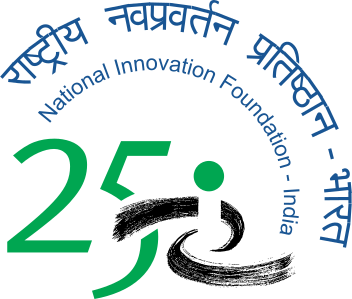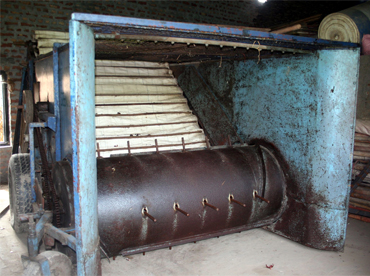Problem addressed:
Jitendra started Mushroom cultivation in the year of 1996, after learning techniques of cultivation from his maternal uncle in Himachal Pradesh. In year 2002, one bed of mushroom fell due to misbalance, as the bamboos were not placed properly inside the soil. It forced Jitendra to make some machine for turning of compost placed on the ground. He developed a machine for turning compost in 2006 but it was suitable for dry compost only and the requirement for mushroom cultivation is moist compost. In 2008, while the compost for mushroom farming had been collected, labor shortage threated to spoil all the compost. Jitendra realized that he should mix the compost well before it gets spoiled. Borrowing money from his brother, after some hits and trails he could develop machine in 2009.
The Compost Making Machine for Mushroom
This is an electricity operated machine, which moves in a straight line cutting through compost heap, turning and mixing all material, adding moisture whenever required, and heaping it back in a line.
The innovator grows the white button mushroom variety whose season is September to March. Compost making and preparation of bed and shed (using bamboo) for cultivation are started in parallel. The material to be made into compost is mixed and spread in the field in rows about 4 feet wide and 4 feet high, it is continuously mixed and moisture added so that it does not dry. Each row needs to be turned/mixed 8-9 times with a gap of two days between each turning. The whole process takes about 28 days. The compost generally gets ready by the 7thturning/ mixing. The pH and moisture content is also monitored regularly. The compost prepared needs to be moist but not sticky, just optimum.
The compost making machine has two motors, 10hp for rotating the blades and 2hp which powers rear wheels. It can cover a heap of 200 ft. in length, 4 feet width and 4 feet height in 25 minutes. Only one person is required to operate it. Towards the end of the heap, the machine has to be manually turned. The innovator claims that using this machine the production of mushroom is about 5-10 % more than that through conventional manual process.
The machine has several advantages. It can properly turn and mix the compost ensuring that no lumps remain in it. As a result, the incidence of disease (yellow mold) is also less. This machine can add moisture and fungicide as well to control diseases. It can be operated on both hard (pakka like cemented floor) and soft (kachcha like farmer's field) surface easily. Using the machine, the time required for compost preparation also gets reduced considerably.
He has made only one machine, there have been some mushroom farmers who have visited him to see his machine. While the ladies of the family do not know much about machine, his brothers have supported him in developing the machine and filing the patent. He plans to further improve it by incorporating a steering so that it can be turned easily at the end of the compost heap.
Considering his contribution to the mushroom industry in the country and Haryana in particular, the Directorate of Mushroom Research, Solan gave him the ‘Progressive Mushroom Grower Award-2013’ during the National Mushroom Mela, Solan.
Scout: Direct
Jeetender Mallik (37) is a young farmer who has developed a compost making machine for mushroom cultivation to address labour shortage issues. This machine can properly turn and mix the compost, remove lumps and add moisture to it as well as a result good quality compost can be prepared in lesser time.
Background
The village Seenkh, where Jeetender lives, is the border village between Panipat and Jind districts and is predominantly agriculture based. Most of the people grow wheat, paddy, maize and sugarcane. Theirs is the only family undertaking mushroom cultivation in the entire village and nearby areas. Jeetender has studied upto class 10th and has been engaged in agriculture ever since. He lives in a joint family with his parents and three brothers and their family. He is married and has a daughter and a son. In his free time, Jeetender likes to play volleyball.
He played basketball as a school student and won a few awards as well. As a child he was not much into studies but sports. His mother recalls that he used to break the toys given to him by her to see what was inside and how it worked. His parents wanted him to study like his brothers but he was totally disinterested. He started experimenting with machines when he became a full time mushroom cultivator and felt the need of making machines for his work. Apart from the mushroom compost making machine, he has also made a sieve for casing soil for mushroom cultivation and a manual drill to make holes for putting bamboos for erecting bamboo shades.
Genesis
Jeetender started mushroom cultivation in 1996 after a visit to his maternal uncle in Himachal Pradesh where he saw mushroom being cultivated. He learnt the cultivation techniques there and came back and started his work at his paternal farm. Low cost mushroom production technology involves the use of thatched houses erected on bamboo sticks drilled in the ground by making holes. The mushroom shed of 100 q compost capacity is erected by making 80 holes, which requires two man days. The quality of holes made by the labour remains uneven and stability of thatched house is comparatively less. In 2002, a bed of mushroom did not give good results as the bamboo stilts were not properly placed. This led Jeetender to develop a mobile electric motor operated hole digger, which has productivity equivalent to eight man hours and yields holes of even depth and diameter. This imparts greater stability to the thatched house which makes it possible to increase the spacing between two adjacent holes which further reduces the cost involved in the construction of a thatched mushroom shed. Later, in 2006, he also developed a simple machine for turning dry compost on the ground.
In 2008, while the compost for mushroom farming had been collected, labour shortage threatened to spoil it as it could not be processed. Jeetender realized that the compost should be mixed in time before it gets spoiled. Borrowing money from his brother, after some hits and trails he could develop a machine in a couple of weeks’ time.
- Motor 1: 10 hp for rotating the blades
- Motor 2: 2 hp to power rear wheel
- A drum with tines/blades is fixed at its periphery & compost strikes to a net covering on top of the drum because of which clods in the compost are broken. On the side of the net there is a nozzle with a pipe, to spray water or chemical to kill fungus inside the compost.
- Conveyer belt is attached at the rear side of the drum for collecting turned compost
- It can properly turn and mix the compost ensuring that no lumps remain in it
- It helps in reducing the disease of Yellow mold in Mushroom
- It can add moisture and fungicide as well to control diseases
- It can be operated on all the surfaces easily - hard (pakka like cemented floor) and soft (kachcha like farmer’s field)
- Efficiency: Machine can heap mushroom compost of 200 ft. in length, 4 feet width and 4 feet height in 25 minutes. Using this machine, the time required for compost preparation is reduced considerably
- Production of mushroom is about 5-10 % more than that through the conventional manual process








